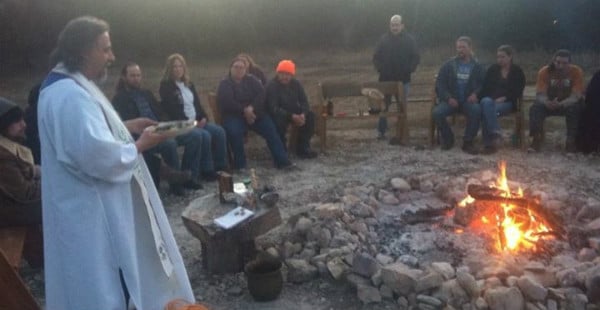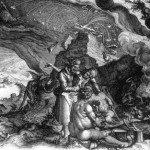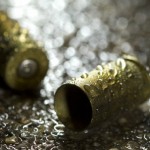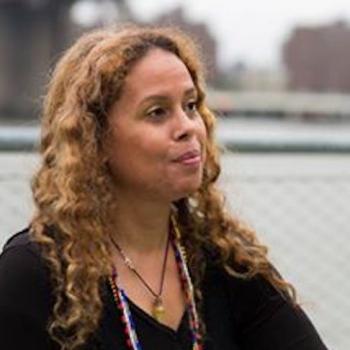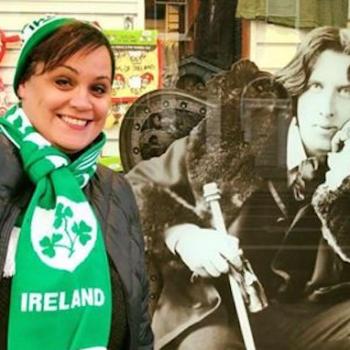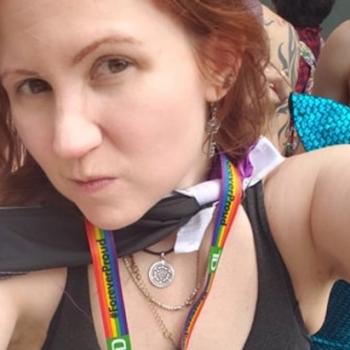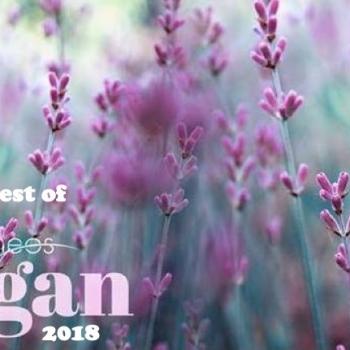Through the Grapevine exists to provide opportunities for Pagan dialogue. One of my goals for this little blog is to see it host interviews with various Pagan-folk, both known and unknown. I’m delighted to welcome Sean Harbaugh to Patheos Pagan as a contributor at Through the Grapevine, and even more excited to see an interview with Drum, one of my favorite ADF Druids. Have something to add to TtG? Email me at jason at patheos with the dot com and all that.
My name is Sean Harbaugh, and I am a druid with Ár nDraíocht Féin: A Druid Fellowship (ADF). I was ordained an ADF priest in 2007, and I am currently serving on the ADF Mother Grove. I also serve the Pacific Northwest as ADF’s NW Regional Druid. I am also a member of several other druid organizations including the RDNA (Reformed Druids of North America) and the MOCC (Missionary Order of the Celtic Cross). I am also a Celtic Reconstructionist and a polytheist.
Enough about me! This is my first of a series of interviews that I will be posting on Patheos. I am going to reach across traditions to interview some interview a wide range of powerful voices in the Neopagan community—some of whom you might not be familiar with. I am starting with Rev. Jean Pagano (Drum), ADF’s Vice Arch-Druid, to get my feet wet. Enjoy!
Sean: Drum, so tell me about yourself.
Drum: My name is Jean Pagano and many folks know me as Drum. I am a Druid, a seeker, and I am always looking to learn new things. Knowledge is a thirst rarely quenched.
I am a neo-pagan. I first started dabbling with divination in the early 70’s with the I Ching and did my first magical working in 1972, with the help of a Hellenic deity. I find that a multiplicity of Gods, separate and distinct, resonates with me and I consider myself a hard-polytheist. I follow an Irish Hearth culture, but am also drawn to a number of different hearth cultures as well.
I believe in the Earth Mother and all she embodies: reverence for Nature, protection for the environment, and the tacit understanding that without the Earth and the Earth Mother, there really is no basis for neo-paganism.
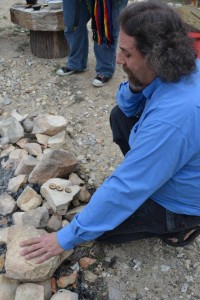 Sean: How did you get your magical name?
Sean: How did you get your magical name?
Drum: When I was first initiated into a tradition, I was asked to come up with a magical name. I went to sleep and dreamt about a friend of mine, Phil, playing the drum kit. I figured that was the name I was supposed to have and that was that. I do not play the drums ☺
Sean: You are a man who is a member of many organizations. Tell me about those and your role in them.
Drum: I am involved in a lot of organisations: RDNA, ADF, OBOD, AODA, Henge of Keltria, Order of White Oak, and a number of others. In some instances, I have an active interest in the group; for others, I want to provide emotional, financial, and spiritual support for some them. Druid is a very broad term and I think there is something to be learned from them all.
EDITOR’S NOTE: There are lots of Druid Organizations, most of them come with fancy abbreviations, here’s a guide.
RDNA-Reformed Druids of North America
OBOD-Order of Bards, Ovates, and Druids
AODA-Ancient Order of Druids in America
Henge of Keltria
Order of White Oak
Sean: Which one do you devote the most time to?
Drum: Without question, most of my energies are focused on ADF. I am a Senior Priest with ADF and also the Vice Arch Druid. ADF now has members on six continents and we are growing. My weekly time allotted to and consumed by ADF is equivalent to a full-time job.
Sean: What are your goals in those groups?
Drum: Some of these groups I have gone through training with some of the groups, like AODA and OBOD. I have learned something from all of them. John Michael Greer’s Sphere of Protection is powerful and the structure of the OBOD training program is rather unique and very well presented. They have an informative and easy to navigate website chock full of interesting morsels of Druidry. I read Ross Nichol’s “Book of Druidry” some years ago and was really drawn to his vision of Druidry.
For some of the others, I want to help them survive. For some, I am on their Board of Directors; for others, I pay for membership because it helps them to survive and reach out to other seekers as well. Druidry is like a lotus, ever-unfolding.
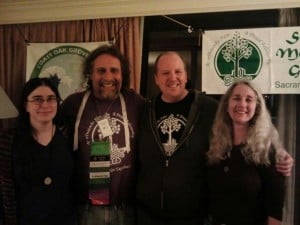
Drum: My greatest passion is to talk to others about Druidry and to relate my experiences so that if people have had “aha!” moments, the will know that they are not alone. When I first went looking, there was little help: no internet and few sources to follow. I love to read, I love to travel, and I love to do the work of Druidry. In addition, working in and with nature has its own rewards and building relationships is very important.
I spend a lot of time every year on the road speaking to people about Druidry and I love the ability to share information with people and to learn from them as well. I have met some of the most remarkable people on the road and the ability to share information with them and to do ritual with them is not only refreshing, it is stimulating as well.
RDNA has the notion of the Journeyman Priest that goes to where they are needed to do the work that must be done. I thank the Gods that I have been able to do this. ADF has its traveling clergy program which does similar outreach. This really helps in reaching out to people for learning, sharing, and fellowship.
Sean: About the RDNA, I know you are devoted to keeping that tradition alive. Tell me about that.
Drum: I first wrote to Isaac (Bonewits ) back in 1983 and said “please tell me about NRDNA”. That started everything, including my work. The beauty of RDNA is in its simplicity. Druidry, as we know it, came to North America in 1963 with the formation of RDNA. I was fortunate enough to meet some of the “Founders”, if I may, of the RDNA at the 50th Anniversary celebration at Carleton and I was pleased at how their liturgy and mine were so very similar and how very well they documented everything that they did. I was touched to learn from Deborah Frangquist that the inclusion of the Earth Mother was due to the belief of the sacredness of the planet and early environmental feelings.
The seed that was planted by RDNA blossomed into many of the groups that I now support, in one way or another. ADF is a direct descendant of RDNA and I just want to keep the elder branch of the family vital for years to come. Many of the features of ADF rites are found in RDNA: Earth Mother, offerings, sacrifices, an omen, and the Waters of Life. The other powerful thing about RDNA is that anyone from any religion can become a Druid and do the work in the RDNA way by acknowledging that Nature is good and that Nature is very good.
The deities and the Orders that are a part of RDNA hearken to beautiful and archetypal deities and concepts that transcend normal religious practices. I believe that RDNA might even be a good candidate for a galactic religion. Each planet will have its own Earth Mother and each planet will have its own solar presence. The beauty of its simplicity may also be strength in its transportability and adaptability.
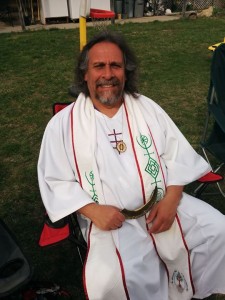
Drum: My Druidic / magical practices are really three-fold. To begin with, I follow a devotional practice, in which the Gods are honoured, thanked, and offerings are made. These offerings may be sweet-smelling incense, as Skip Ellison calls it, or beautiful words, or spirits, or even just plain water. I have a number of altars throughout my home – as well as shrines – and I use them for devotional and magical purposes. I do devotional work each and every day. An altar is nice, but not necessary. I do make liberal use of spirits (whiskey) in offerings. I feel that as the whiskey evaporates, that it is consumed by the entities in question.
I honour my Lares, my household spirits. They watch over my home, my hearth, and my family as I honour their presence and give them a home since I have taken theirs for a period of time. They are honoured first thing every morning, after I wash my hands. In doing so, I follow a long-time Indo-European tradition of purification followed immediately by prayer.
I follow a ritual practice, which calls for performing rituals, when the need arises or when the time is right. My liturgies vary from RDNA for more impromptu rites to the formality of the ADF Core Order when a more studied approach is needed. While many of my rituals, over the course of months, are solitary, I do heartily enjoy the ones that are done with like-minded people. What a better way to honour the Gods than to do it with others. The greater the voice; the greater the song.
Honouring the Earth Mother is critically important. Without the Earth Mother, we wouldn’t be here. Working with and for the Earth Mother means being mindful of our usage of resources and especially is being gentle residents on that very Earth Mother. Recycling, reuse, and returning items are vitally important. In our ritual practice, the Earth Mother comes first. In our everyday lives, she should come first as well.
Finally, I work magic. I have always claimed that magic is nudging the universe. If we nudge just right, then perhaps, just maybe, something will arise from our efforts. I do my evening devotionals at midnight and I think that this is an especially auspicious time for such workings. Magic may be done at an altar with a fire, or out of doors, under the stars. I carry magical tools with me at all times and I love finding impromptu tools on the spot where I intend to do the work.
Sean: You are one of the original members of ADF, how have you seen the organization grow since the early days of Isaac Bonewits?
Drum: Wow, that is a good question. In the early days, those of us at a distance from the East Coast would wait for long periods of time for information. Much of what happened with ADF happened through correspondence of some form or other. I think, more than anything, ADF started as a well-intentioned extended tribe, one that fancied scholarship and one that followed Isaac’s vision.
Our forays into media have always been important ones, from News from the Mother Grove, through Druid’s Progress through Oak Leaves. While some may not be enamoured with print media, these publications have offered news, presented works by the best and brightest in our organisation, and provided an outlet for not creativity but for outreach.
Training and the Training Programs have been a huge change and a step in the right direction as far as I am concerned. Super Druid, the early attempt at Clergy Training, was too difficult and most people did not want to invest the time to get the results. The naming of priests by the Mother Grove was a transitional moment for ADF, one that provided rewards and challenges for the organisation at the same time. A formalized training program for the Clergy, as well as other training programs, really pushed home the need for scholarship and excellence, both which were important to Isaac.
The growth in the number of groves has also been a huge change. Many protogroves and groves have come and gone along the way, but many have stayed and flourished. A number of Protogroves and Groves practice different hearth cultures and as such have provided a way of learning and seeing other hearth cultures in action.
Our training programs have grown a lot, for those who are interested in training, and our Clergy are some of the best trained clerics in Neopaganism. The programs are rigourous, practical, and meant to provide both an education and the ability to grow.
We are blessed that more and more information is becoming available to further our research and understanding of those hearth cultures and individuals that preceded us. While we are not strictly reconstructionist, we look to the lessons and learning of the past to create something new moving forward.
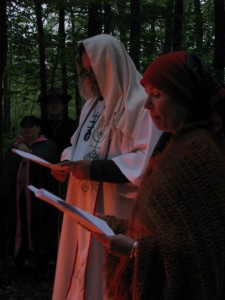
Drum: ADF is now, more than ever, becoming an international organisation. We have members on six continents and groves and protogroves on four continents (one more is in the approval process for an additional continent). ADF is not just an American phenomenon, but a global work-in-progress. We have members that are translating our literature into different languages and this has really opened some doors for us. We have found people in the Czech Republic, for example, that are doing ADF-style rituals but may or may not be members. Our liturgy, I believe, appeals to a broad group of people. We offer a sensible and studied view of liturgy and practice that work well for both the solitary practitioner and for the member of a protogrove or grove.
Isaac Bonewits’ vision, formulated some time ago, is still vital. We are really working on tooling that vision to the many tools we have now that we did not have back when it was first formulated. Social media, Google Hangouts, and YouTube is allowing us to present ritual and material to people all over the world. We have a prolific group of writers, artisans, bards, liturgists, and people of many talents who are working to extend what-we-do-as-ADF into a song, a story, a work of art, a piece of liturgy that loves the Land, honours the Gods, and serves the Folk.
I believe that ADF’s emphasis on right-practice (orthopraxy), as opposed to right-belief (orthodoxy) is something that will serve us well in the years to come. For people who are interested in a well-researched approach that still provides for individual experience and expression, I think that ADF will the need for people to touch the Gods, work with the Land and the Earth Mother, and serve the needs of the people be they solitary or in a group.
Sean: As Vice Arch-Druid, how do you see your role in advancing the vision of ADF?
Drum: I think the most important thing I can do is to keep Isaac’s vision going. I do this by being available, spending time talking with people, whether in person, on the telephone, via email, Facebook, or at festival. I am working with Kirk Thomas, the current Arch Druid, to try to coordinate our efforts to move ADF forward.
While we both spend time at ADF festivals, I have been spending more and more time at Pan Pagan festivals that are NOT necessarily ADF festivals. Whenever we have presented ADF rituals to non-ADF folks, we have received a lot of positive feedback for what we do and we do pick up new members.
I was fortunate enough this year to headline a festival and the fellowship, workshops, and sharing were really first-rate. We had a large turn-out for our main ritual and our presentation went really, really well. As a Senior Priest, as a person who has completed many of the training programs, and as someone who is very dedicated to ADF, I am in a good position to talk about ADF, what we do, and where we are going. I am excited about ADF – I hope that excitement is contagious.
Sean: As a member of the Board of Cherry Hill Seminary, how do you view them in relation to the evolution of the pagan community as a whole? Do you see them being more and more relevant?
Drum: Cherry Hill is critically important to the pagan community because it provides serious and competent training and education. In addition, and perhaps most importantly, it provides relevance to what we do. Cherry Hill is working very hard to become accredited, much like the movement to which it serves.
Many members of the neo-pagan world want to learn: they thirst for knowledge, they love books, and they strive for excellence. Cherry Hill Seminary is a modern Seminary that brings learning into everyone’s home via the Internet. If our pagan predecessors would have had the Internet, they would have done the same thing.
I have been honoured to be a part of the Board and also highly impressed by the caliber of individuals on the board and their commitment to education. I believe that Cherry Hill Seminary will become more and more relevant as the months and years go by and once accreditation is achieved, it will be THE place to look for neo-pagan education.
I would encourage everyone to take a look at what Cherry Hill has to offer and try just one course to see. I believe that people will not be disappointed.
Sean: Thank you for answering my questions. Do you have anything else you’d like to add?
Drum: Sean, thank you so much for the opportunity to talk about ADF and about my Druidry. I really appreciate it.
Sean Harbaugh is a druid with Ár nDraíocht Féin: A Druid Fellowship (ADF). He was ordained an ADF priest in 2007 and is currently serving on the ADF Mother Grove. He also serves the Pacific Northwest as ADF’s NW Regional Druid. Sean is also a member of several other druid organizations including the RDNA (Reformed Druids of North America) and the MOCC (Missionary Order of the Celtic Cross). I am also a Celtic Reconstructionist and a polytheist. Rev. Sean Harbaugh can be reached at [email protected]


